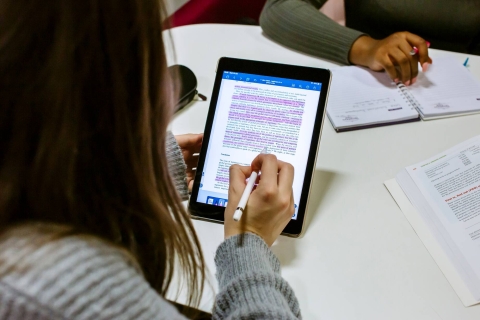
Main navigation - Library
Secondary Menu - Library
Secondary menu
Search suggestions update instantly to match the search query.
Recent changes to Ebook Central ebooks

Ebook Central recently moved from presenting ebooks as pdf documents to using the modern and more accessible epub format. Epub ebooks are easier to read and navigate, and allow you to resize and reflow text to be easily readible on any sized device. Epub ebooks can include interactive audio and video content, which the old pdf format never could. The epub format also works with more assistive technologies than the old pdf format, allowing those with a visual impairment to enjoy the full ebook experience without having to switch to a stripped back 'text-only mode'.
Some ebooks will continue in pdf format, where the publisher has yet to supply an epub version. If you experience any difficulties accessing any of our electronic resources, especially if you have a visual or cognitive condition that makes reading text or from a screen more difficult, please tell your Faculty Librarian straight away - you will find their email address on your subject page. They may be able to provide you with access to alternative, accessible formats.
What's so much better about the epub format?
The epub file format was developed much more recently than the old pdf document. Epubs:
-
adapt the display of responsively so they are easy and attractive to read on different devices, while pdfs simply scaled to fit the screen size, often making the text far too small to read
-
allow for a better navigation structure that makes it easier to find your way around ebooks and also provides screen readers with a greatly improved headings structure that makes them far more accessible - e.g. it allows you to toggle between sections
-
are more accessible and inclusive - they allow full ebooks to be experienced using screen magnifiers, display changers and screen readers.
Referencing implications - citations without page numbers
When you quote from a published source, you give the page number in the in-text citation (e.g. Smith, 2017, p. 256). Only with epub ebooks, the page numbers now vary depending on the font and screen/window size you are using to view them. The same quote might appear on different pages depending on the device and device settings used to view it. That doesn't matter unless you are asking your friend to look at something on a particular page and they can't find it, or you are including a direct quote or figure and want to pinpoint the page/section where that quote or figure can be found in the cited work.
Since the content that fits on each page in an in epub format ebooks changes with the screen and font size used to view it, pointing to specific page numbers does not help someone else to find the same point in an epub format ebook. You should therefore treat epub ebooks as if they have no page numbers for the purposes of referencing.
For in-text citations with page numbers in epub ebooks (from any source), follow the referencing guidance on the Library website for sources without page numbers. We cannot currently link directly to individual guidance pages in our referencing guidance.
Go to In-text citations for APA 7 > "Page numbers and in-text citations" and follow the guidance under "Citing from a source without page numbers".
Finding this guidance from the Library homepage
If you ever have to find this section without the above link, you can find it from the Library homepage by clicking/tapping on the following: Blue Referencing button > APA 7th ed. (link in page) > In-text citations (left-hand menu) > Page numbers and in-text citations (expandable page section), then read the "Citing from a source without page numbers" section.
Remember you can always chat with a librarian online everyday 24/7 (or at the Library Help Desk, 11 am - 3pm Monday-Friday) and we can help you with any aspect of referencing, including finding the relevant guidance!
Read more
Read more on the Ebook Central website's helpful guide: "What are the differences between EPUB and PDF ebooks when reading online on Ebook Central?"

